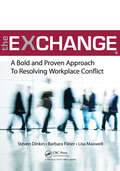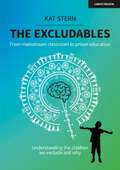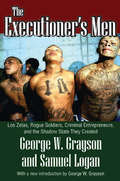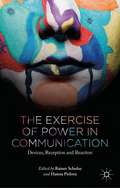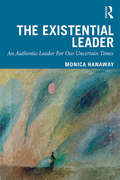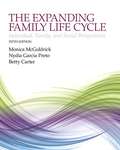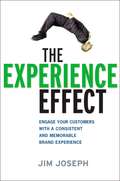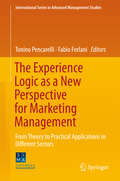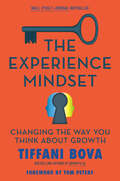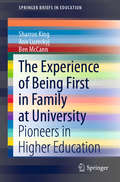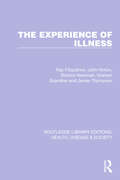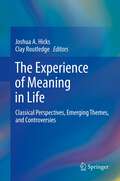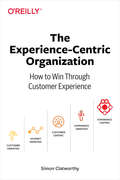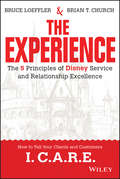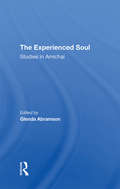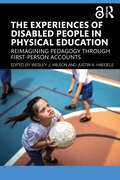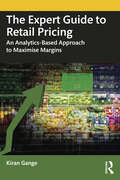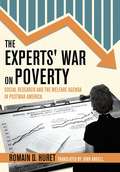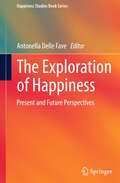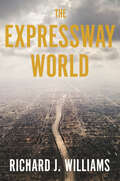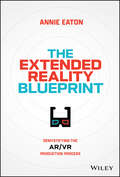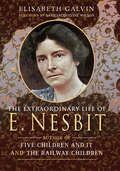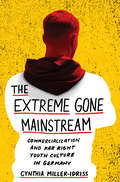- Table View
- List View
The Exchange: A Bold and Proven Approach to Resolving Workplace Conflict
by Lisa Maxwell Steven Dinkin Barbara FilnerThis book introduces a process called The Exchange that will make ones job easier. It is about the kinds of conflicts that drive a manager or supervisor crazy. The book is intended for the designated problem solvers, whether official or unofficial.
The Excludables: From mainstream classroom to prison education – understanding the children we exclude and why
by Kat SternWhen it comes to 'The Excludables', it is time to shake up the debate.Students who are excluded from school, and society, are at a higher risk of being incarcerated. They are more likely to have mental health difficulties, special educational needs, live in poverty, have social care involvement and they disproportionately come from certain ethnic groups. This book pulls on all those threads using up to date research and establishes a deeper understanding of how and why these things affect school behaviours. The factors that lead to exclusion are complex, and this book meets that challenge head on, including the kinds of “crunchy bits” that are usually avoided at all costs, such as children who are high in callous-unemotional traits, and trauma-informed approaches in prison education.Written by an experienced educator and behaviour consultant, this book steps away from the worn-out discourse that surrounds behaviour in schools, and away from the notion that educators are the only relevant experts. Get ready to explore genetics, bias, epistemic trust, and the human stress-response system; all examined through the lens of the realities of behavioural challenge faced by educators every day.This is a read that will confront everyone in some way.
The Excludables: From mainstream classroom to prison education – understanding the children we exclude and why
by Kat SternWhen it comes to 'The Excludables', it is time to shake up the debate.Students who are excluded from school, and society, are at a higher risk of being incarcerated. They are more likely to have mental health difficulties, special educational needs, live in poverty, have social care involvement and they disproportionately come from certain ethnic groups. This book pulls on all those threads using up to date research and establishes a deeper understanding of how and why these things affect school behaviours. The factors that lead to exclusion are complex, and this book meets that challenge head on, including the kinds of “crunchy bits” that are usually avoided at all costs, such as children who are high in callous-unemotional traits, and trauma-informed approaches in prison education.Written by an experienced educator and behaviour consultant, this book steps away from the worn-out discourse that surrounds behaviour in schools, and away from the notion that educators are the only relevant experts. Get ready to explore genetics, bias, epistemic trust, and the human stress-response system; all examined through the lens of the realities of behavioural challenge faced by educators every day.This is a read that will confront everyone in some way.
The Executioner's Men: Los Zetas, Rogue Soldiers, Criminal Entrepreneurs, and the Shadow State They Created
by George W. GraysonLos Zetas represent a new generation of ruthless, sadistic pragmatists in Mexico and Central America who are impelling a tectonic shift among drug trafficking organizations in the Americas. Mexico's marines have taken down the cartel's top leaders; nevertheless, these capos and their desperados have forever altered how criminal business is conducted in the Western Hemisphere. This narrative brings an unprecedented level of detail in describing how Los Zetas became Mexico's most diabolical criminal organization before suffering severe losses.In their heyday, Los Zetas controlled networks of American police, politicians, judges, and businessmen. The Mexican government is losing its "war on drugs," despite the military, technical, and intelligence resources provided by its northern neighbor. Subcontracted street gangs operate in hundreds of US cities, purchasing weapons, delivering product, executing targeted foes, and bribing the US Border Patrol. Despite crippling losses Los Zetas still dominate Nuevo Laredo, the major portal for legal and illegal bilateral commerce. They also work hand-in-glove with the underworld in Guatemala, El Salvador, and Honduras, as well as with gangs like the Maras Salvatruchas.
The Exercise of Power in Communication
by Rainer Schulze Hanna PishwaPower Exercise explores the various choices speakers or communicators make when expressing power relations in modern societies. The volume brings together several disciplines, such as linguistics, sociology, communication studies and social psychology, to give insight into how interactants co-construct different aspects of power in their everyday life. The chapters reveal that the power potential of linguistic elements is dependent on context and is by no means fixed or predetermined, whichprovides implications for research methodology.
The Existential Leader: An Authentic Leader For Our Uncertain Times
by Monica HanawayThe Existential Leader: An Authentic Leader For Our Uncertain Times invites us to reconsider our preconceptions about leadership, introducing a new model more in line with our uncertain times: existential leadership. Monica Hanaway presents an illuminating overview of existential thinking and describes how an understanding of philosophy can improve leadership, drawing on existing leadership theories to show how this new model is more fitting for the challenges of today. The approach is primarily philosophical, rather than systemic or behavioural. It invites us to re-examine what we think about leaders, whether we really need leaders at all, and, if so, which existential concerns leaders must address. The book offers an introduction to the development of existential thinking and main concerns, including meaningfulness, anxiety, loneliness, freedom, choice and responsibility, authenticity, and values and beliefs. These are explored in the leadership context, with practical approaches for using these in everyday leadership dilemmas. Unique and accessible, The Existential Leader paves a way for modern leadership perfectly suited to the challenging times we live in. Innovative, theoretical and applicable to our changing world landscape, this book will appeal to coaches, HR and L&D professionals, executives, business consultants, and current and future leaders. It will also be of interest to academics and students of coaching psychology, applied philosophy and psychology.
The Expanded Family Life Cycle: Individual, Family, and Social Perspectives (Fifth Edition)
by Nydia A. Garcia Preto Monica McGoldrick Betty A. CarterUpdated, expanded, and more comprehensive than ever, this new Fifth Edition a classic family therapy resource, The Expanded Family Life Cycle, gives readers a solid understanding of human development and the life cycle. Featured are a groundbreaking integration of individual development within a systemic context discussion of the increasing racial, ethnic, and cultural diversity across the life cycle in the United States today; life cycle perspectives on LGBT issues, alcohol, sexuality, migration, social class, violence in the family, and assessment of “home place” as fundamental to clinical work.
The Experience Effect: Engage Your Customers with a Consistent and Memorable Brand Experience
by Jim JosephThe overall experience of the buying process ultimately determines whether consumers will pay money for a product or service: they weigh what they are purchasing with their responses to the marketing message, the advertising, the sales approach, the website, the interaction with company personnel, and more. Jim Joseph calls the ideal combination these elements the “experience effect.” In this book, he shows how any business can create one for its brand to ensure customers leave satisfied. The Experience Effect does this by teaching readers how to understand their brand’s target audience, conduct more effective market research, connect with customers on an emotional level, establish appropriate and engaging customer touchpoints, link digital and nondigital media, and perform a gap analysis of their brands’ marketing. Filled with practical advice and real-life examples, this insightful guide helps companies of any type and size coalesce the varied elements of their business into a seamless consumer experience that resonates deeply, builds brand loyalty, and keeps customers coming back.
The Experience Logic as a New Perspective for Marketing Management: From Theory To Practical Applications In Different Sectors (International Series in Advanced Management Studies)
by Tonino Pencarelli Fabio ForlaniThis book provides stimulating insights into the ways in which the adoption of experience logic can revitalize marketing perspectives and stimulate novel approaches to the creation and delivery of value. The first part of the book, which has a theoretical focus, reviews the international literature and offers conceptual observations on the experiential perspective. Suggestions are made on how experience logic can act as a new driver for the management of marketing processes in firms within the context of the experience economy. In the second part of the book, attention turns to the applications of experience logic in different sectors, including tourism, commerce, culture, and trade shows. Company-specific examples of benefits of the experiential approach are also explored in case studies on gift box providers, marketing of traditional local products, and the cosmetics industry. The book will be of particular interest for marketing specialists, but will additionally be of value for managers in private companies and public bodies who wish to enhance their marketing methods.
The Experience Mindset: Changing the Way You Think About Growth
by Tiffani BovaFrom the Wall Street Journal bestselling author of Growth IQ comes a guide to enhancing customer and employee experience simultaneously for unprecedented revenue growthIn the war for customer acquisition, businesses invest millions of dollars to improve customer experience. They deliver packages faster, churn out new products, and endlessly revamp their UI, often putting greater strain on employees for diminishing returns. According to Tiffani Bova, this siloed focus on customer experience – without considering the impact on your staff – actually hinders growth in the long run. The most successful companies adopt an Experience Mindset that strengthens both employee experience (EX) and customer experience (CX) at the same time.Based on exclusive research from two Salesforce-sponsored studies of thousands of employees and c-suite executives, The Experience Mindset details exactly how your company can adopt an Experience Mindset, at scale. It&’s not enough to know that happy employees equals happy customers. You must have an intentional, balanced approach to company strategy that involves all stakeholders – IT, Marketing, Sales, Operations, and HR – with KPIs and ownership over outcomes. In this ground-breaking book, filled with case studies of leading companies and never-before-seen research, you&’ll learn:How people, processes, technology, and culture contribute to the &“virtuous cycle&” of EX and CX.Why the best companies have programs that minimize the customer&’s effort as well as the employee&’s effort (and how companies like Southwest and Best Buy get this right)How to effectively roll out technology solutions that boost both EX and CX (hard truth: only 20% of customer-facing employees believe technology makes their job easier. Employees want a seamless technology experience, just like your customers.)What metrics you can use to measure EX, CX, and ultimately, the effect of the two together. You can&’t improve what you can&’t measure. Employees are the heart of your business. If you want to remain competitive in today&’s marketplace, investing in people is no longer a nice-to-have, but rather a must have.
The Experience of Being First in Family at University: Pioneers in Higher Education (SpringerBriefs in Education)
by Ben McCann Sharron King Ann LuzeckyjThis book provides an in-depth analysis of what it means to be the first in family at university. It examines the factors that influence first in family students' decisions to enrol, attend and continue at university, and how their hopes, dreams and ambitions for the future affect their university experience. Using survey data and semi-structured interviews, the book offers valuable and far-reaching insights into the first in family student experience, and provides recommendations for future practice at the national and institutional level for teaching and professional staff as well as for first in family students. As universities face intense competition for students and growing economic constraints due to funding cuts and increasing costs, this book comes at a critical time.
The Experience of Illness (Routledge Library Editions: Health, Disease and Society #13)
by James Thompson Graham Scambler Ray Fitzpatrick Stanton Newman John HintonOriginally published in 1984, this book focuses, firstly, on how patients interpret and act in response to symptoms of illness; secondly on how social and psychological factors influence the treatment process; and thirdly, on certain kinds of illness where the psychosocial perspective is of particular importance to the providers of health care – for example, chronic or particularly disabling illnesses. It demonstrates how essential it is to bring an interdisciplinary perspective from the social and behavioural sciences to an understanding and interpretation of behaviour in relation to illness. It will be of central concern to all health professionals in training and in practice and to social scientists interested in health care.
The Experience of Meaning in Life: Classical Perspectives, Emerging Themes, and Controversies
by Joshua A. Hicks Clay RoutledgeThis book offers an in-depth exploration of the burgeoning field of meaning in life in the psychological sciences, covering conceptual and methodological issues, core psychological mechanisms, environmental, cognitive and personality variables and more.
The Experience-Centric Organization: How to Win Through Customer Experience
by Simon David ClatworthyIs your organization prepared for the next paradigm of customer experience, or will you be left behind? This practical book will make you a winner in a market driven by experience, enabling you to develop desirable offerings and standout service to attract loyal customers.Author Simon Clatworthy shows you how to transform your organization into one that aligns your customers’ experiential journey with platforms, organizational structures, and strategic alliances. Rather than treat customer experience as an add-on to product and service design, you’ll discover how experience-centricity can drive the whole organization.Learn the five steps necessary to transform into an experience-centric organizationExplore the underlying structure needed to design and deliver memorable experiencesUnderstand how customers and clients experience products and servicesDevelop experiential DNA as an extension of your brand DNABe proactive by translating cultural trends into experiences
The Experience: The 5 Principles of Disney Service and Relationship Excellence
by Bruce Loeffler Brian ChurchBring Disney-level customer experience to your organization with insider guidance The Experience is a unique guide to mastering the art of customer service and service relationships, based on the principles employed at the renowned leader in customer experience — the Walt Disney Company. Co-Author Bruce Loeffler spent ten years at Disney World overseeing service excellence, and has partnered with Brian T. Church in this book, to show you how to bring that same level of care and value to your own organization. Based on the I. C.A.R.E. model, the five principles — Impression, Connection, Attitude, Response, and Exceptionals — give you a solid framework upon which to raise the level of your customer experience. You will learn how to identify your customer service issues and what level of Experience you are currently offering. You can then determine exactly what the "customer experience" should be for your company, and the changes required to make it happen. The Walt Disney Company is the most recognized name in the world for customer service. The "Disney Experience" draws customers from all around the world,. This book describes what it takes to achieve that level of Experience, and how any organization can do it with the right strategy and attention to detail. When the Experience is enhanced, the opportunity arises to convert customers to ambassadors who will share their Experience with others. Find "the experience" and what it means to the Organization Learn the five levels of experience, and why most companies fail at it Identify service problems that face every company in the marketplace Utilize the Experience Quotient and apply the I. C.A.R.E. principles Learn how to convert customers to ambassadors who share their story with others Customers are the lifeblood of business. A great product offering isn't enough in today's marketplace, where everyone's looking for an "experience.” Imagine the kind of value a Disney-level customer experience could bring to your organization. The Experience is a guide to getting there, from an insider's perspective.
The Experienced Soul: Studies In Amichai
by Glenda AbramsonYehuda Amichai is Israel's foremost poet as well as a significant novelist and dramatist. He has received every major Israeli prize for literature, and his poetry has been translated into over twenty languages. Amichai has served as poet-in-residence at major universities across the United States and has been a Sequent visitor to the University of Oxford. In this volume, the world's leading authorities on Amichai explore all the major genres and themes of his work. The result is an important book that is a unique and comprehensive scholarly overview of a major twentieth-century literary figure. It will prove especially valuable to those teaching modern Hebrew literature at English-language universities.
The Experiences of Disabled People in Physical Education: Reimagining Pedagogy through First-Person Accounts
by Justin A. Haegele Wesley J. WilsonBringing together a set of first-person accounts of physical education from the perspectives of disabled children and adults, this book puts disabled people’s voices in the foreground.The book provides a rich set of case study material that deepens our understanding of the experiences of disabled people and challenges students, researchers, and practitioners to reflect critically upon their own positionality. The first part of the book discusses the ways in which disability has been conceptualized, how the voices of disabled people have sometimes been marginalized, and how nondisability power has historically framed the narratives of disabled people in physical education literature. It also discusses the innovative methods used in this book—such as storytelling through recorded conversations and drawings in addition to more traditional chapter writing—to empower disabled children and adults to act as authors of their own stories. Then the book presents the stories themselves in a variety of written, narrative, and alternative formats, a series of authentic accounts of the lived experiences of disabled people in physical education. Finally, the book concludes with the editors’ final thoughts and reflections about this collection of stories that can be used in the classroom to foster dialogue and encourage critical thinking. Importantly, these prompts have been co-constructed between the editors and the disabled people themselves.This book is essential reading for any course in adapted physical education, physical education, or disability, for any pre- or in-service teacher, instructor, or coach working with disabled people, and for people who experience disability or their families with an interest in education, physical activity, or methods for elevating the voices of disabled people.
The Expert Guide to Retail Pricing: An Analytics-Based Approach to Maximise Margins
by Kiran GangeGoing under the hood of retail strategy, this book provides in-depth coverage of how retailers can leverage the latest in data analytics and technology to improve profitability and customer value through pricing. Retail pricing is not about dollars, pounds or euros, but the value a customer associates with a product, which can and does change over time. To maximize revenues and profits, pricing must be dynamic, strategic, and in today’s hyper-connected and -competitive world, scientific. Using technology to gather customer insights and create data-driven pricing approaches can also enhance the customer experience, improve vendor management, help monitor competitors, and ensure market efficiency – including the much-needed reduction of waste in the food sector. This book uses case studies from around the globe to illustrate the evolution of retailing and offers takeaways with each chapter to enable retailers to manage the future of pricing. Retail and pricing managers, retail sector consultants, and students of sales and marketing will welcome this book’s innovative solutions to one of bricks-and-mortar retailing’s most critical challenges.
The Expert Guide to Retail Pricing: An Analytics-Based Approach to Maximise Margins
by Kiran GangeGoing under the hood of retail strategy, this book provides in-depth coverage of how retailers can leverage the latest in data analytics and technology to improve profitability and customer value through pricing. Retail pricing is not about dollars, pounds or euros, but the value a customer associates with a product, which can and does change over time. To maximize revenues and profits, pricing must be dynamic, strategic, and in today’s hyper-connected and -competitive world, scientific. Using technology to gather customer insights and create data-driven pricing approaches can also enhance the customer experience, improve vendor management, help monitor competitors, and ensure market efficiency – including the much-needed reduction of waste in the food sector. This book uses case studies from around the globe to illustrate the evolution of retailing and offers takeaways with each chapter to enable retailers to manage the future of pricing. Retail and pricing managers, retail sector consultants, and students of sales and marketing will welcome this book’s innovative solutions to one of bricks-and-mortar retailing’s most critical challenges.
The Experts' War on Poverty: Social Research and the Welfare Agenda in Postwar America (American Institutions and Society)
by Romain D. HuretIn the critically acclaimed La Fin de la Pauverté?, Romain D. Huret identifies a network of experts who were dedicated to the post-World War II battle against poverty in the United States. John Angell's translation of Huret's work brings to light for an English-speaking audience this critical set of intellectuals working in federal government, academic institutions, and think tanks. Their efforts to create a policy bureaucracy to support federal socio-economic action spanned from the last days of the New Deal to the late 1960s when President Richard M. Nixon implemented the Family Assistance Plan. Often toiling in obscurity, this cadre of experts waged their own war not only on poverty but on the American political establishment. Their policy recommendations, as Huret clearly shows, often militated against the unscientific prejudices and electoral calculations that ruled Washington D.C. politics.The Experts' War on Poverty highlights the metrics, research, and economic and social facts these social scientists employed in their work, and thereby reveals the unstable institutional foundation of successive executive efforts to grapple with gross social and economic disparities in the United States. Huret argues that this internal war, coming at a time of great disruption due to the Cold War, undermined and fractured the institutional system officially directed at ending poverty. The official War on Poverty, which arguably reached its peak under President Lyndon B. Johnson, was thus fomented and maintained by a group of experts determined to fight poverty in radical ways that outstripped both the operational capacity of the federal government and the political will of a succession of presidents.
The Exploration of Happiness
by Antonella Delle FaveThis specially selected collection of landmark work from the Journal of Happiness Studies maps the current contours, and the likely future direction, of research in a field with a fast-rising profile. This volume, which inaugurates a series aiming to explore discrete topics in happiness and wellbeing studies, features selected articles published in the Journal of Happiness Studies during its first decade, which culminated in an 'impact factor' in 2011. As the introductory work in the series, it provides readers with a vital overview of the prominent issues, problems and challenges that well-being and happiness research has had to overcome since its appearance on the scientific stage. The journal's very success evinces both the high scientific quality of the research covered, and the steadily growing interest in a subject that draws responses from a vast range of epistemological aiming points, taking in economics, sociology, psychology, philosophy, education and medicine. The series of volumes following this debut publication will represent a unique contribution to the literature in their multidisciplinary focus on particularized topics. It is reckoned that this will help strengthen cross-disciplinary synergies among authors investigating the same topic, as well as whet the appetite for happiness research among professionals and experts inhabiting a variety of academic domains. This volume addresses the theory of well-being and happiness, the different research approaches now probing their features and components, and the socio-economic and cultural issues that impact on their promotion..
The Expressway World
by Richard J. WilliamsIn the demonology of the contemporary city, is there anything more toxic than the expressway? Dividing neighbourhoods, depressing land values, concentrating atmospheric pollutants, the mammoth infrastructure of the expressway is now increasingly crumbling into the ground. How did we build the expressway world in the first place? And what are we going to do now with it now? This eye-opening book explores these questions partly through the great expressway abolitions of recent years, such as Boston’s Central Artery (buried and covered by a park) and Seoul’s Cheonggyecheon (replaced with an artificial river). But the book also uncovers the hidden stories of expressways that have become weird attractions in their own right, from London’s Westway to São Paulo’s Minhocão, celebrated in art and literature. Above all, the book proposes, counterintuitively, that we find ways to live with the expressway world and to adapt it to a different future, inspired by the many examples where people have already reinvented this challenging legacy on their own terms. Engaging with case studies across the world and recent thinking in the environmental humanities and architectural theory, this is a thought-provoking invitation to reconsider the most maligned structures of the recent urban past.
The Extended Reality Blueprint: Demystifying the AR/VR Production Process
by Annie EatonFollow a tried-and-tested approach to integrating augmented and virtual reality into your business The Extended Reality Blueprint focuses on design for non-gaming or gaming adjacent applications in extended reality (XR), including augmented and virtual reality. Author Annie Eaton is a leading producer of immersive content in the XR space. Many of Annie's clients come to her with the same questions, often not knowing where to begin as they seek to implement extended reality solutions into their business. This book presents the discovery and product development process through an immersive technology lens. You will walk through the XR production process and learn how to apply this technology directly within your organizations in a meaningful and effective way. Join leading businesses like Delta Air Lines, Mars Wrigley, Georgia-Pacific, and JLG Industries, and learn how top companies are leveraging XR for greater market share, engagement, and profit. Learn about the latest applications of extended reality (XR), including augmented and virtual reality. Discover the steps of the XR product development process, including how to find profitable uses of XR and decide on technology suites. Assemble effective teams of XR developers, designers, artists, and other key members to bring your projects to fruition and success. Learn from the real-world examples and lessons learned of businesses that have taken the leap into extended reality. The Extended Reality Blueprint, delivers a concrete, actionable process for brining extended reality into your organization and embracing this crucial technology to remain current.
The Extraordinary Life of E Nesbit: Author of Five Children and It and The Railway Children
by Elisabeth GalvinImagine being one of the most well-loved children’s authors of all time, yet your readers don’t know if you’re a man or a woman. Or even your real name. E. Nesbit is really Edith Nesbit, who wrote an extraordinary 98 novels, plays and poetry collections for children and adults between 1885 and 1923. She is credited as the first modern writer for children whose work has influenced authors from Oscar Wilde to C.S. Lewis, Noël Coward to J.K. Rowling. Even though it was published more than 100 years ago, The Railway Children remains one of the most popular children’s books ever written and it has never been out of print. But for Edith, the truth of her life is stranger than her fiction – and it’s a truth she was keen to hide from the public. Edith’s father died when she was four, resulting in a peripatetic childhood across Europe. At 21 years old she was seven months’ pregnant when she married a penniless libertine who became a famous journalist, Hubert Bland. Together as early socialists they were founding members of the Fabian Society, from which the Labour Party has its foundations. A Bohemian and an eccentric, Edith became a mother of five children – two of whom she adopted in secret after her husband had an affair with a close friend (who subsequently lived with them as their housekeeper). It was shortly after the sudden death of her beloved son that Edith wrote her first bestseller in 1899, a groundbreaker that dramatically changed the course of children’s literature. On the eve of World War I, Edith’s husband died and she married a captain of the Woolwich Ferry. A cheerful cockney sparrow, Tommy Tucker proved to be Edith’s unwitting romantic hero who loved and cherished her until she died in near-poverty on the Romney Marshes of Kent.
The Extreme Gone Mainstream: Commercialization and Far Right Youth Culture in Germany
by Cynthia Miller-IdrissHow extremism is going mainstream in Germany through clothing brands laced with racist and nationalist symbolsThe past decade has witnessed a steady increase in far right politics, social movements, and extremist violence in Europe. Scholars and policymakers have struggled to understand the causes and dynamics that have made the far right so appealing to so many people—in other words, that have made the extreme more mainstream. In this book, Cynthia Miller-Idriss examines how extremist ideologies have entered mainstream German culture through commercialized products and clothing laced with extremist, anti-Semitic, racist, and nationalist coded symbols and references.Drawing on a unique digital archive of thousands of historical and contemporary images, as well as scores of interviews with young people and their teachers in two German vocational schools with histories of extremist youth presence, Miller-Idriss shows how this commercialization is part of a radical transformation happening today in German far right youth subculture. She describes how these young people have gravitated away from the singular, hard-edged skinhead style in favor of sophisticated and fashionable commercial brands that deploy coded extremist symbols. Virtually indistinguishable in style from other popular clothing, the new brands desensitize far right consumers to extremist ideas and dehumanize victims.Required reading for anyone concerned about the global resurgence of the far right,The Extreme Gone Mainstream reveals how style and aesthetic representation serve as one gateway into extremist scenes and subcultures by helping to strengthen racist and nationalist identification and by acting as conduits of resistance to mainstream society.
